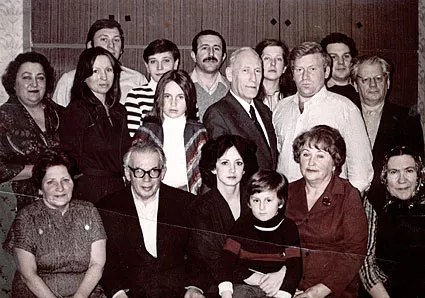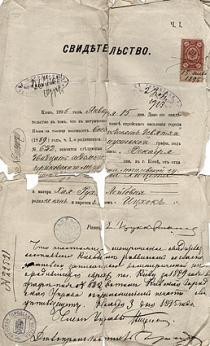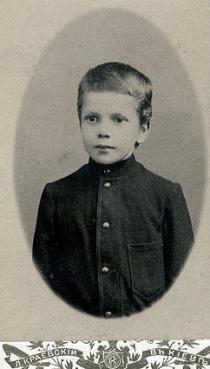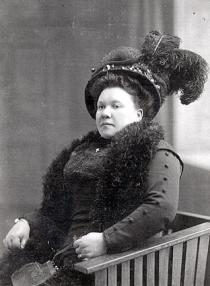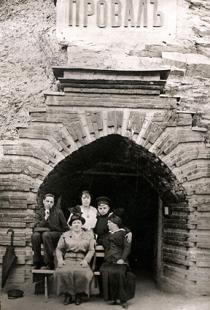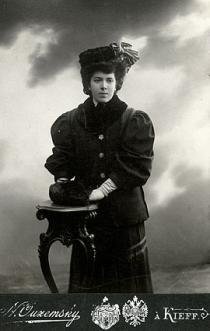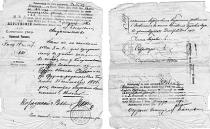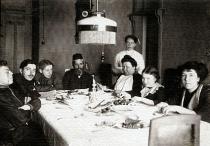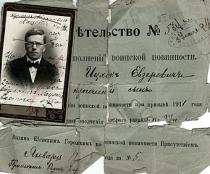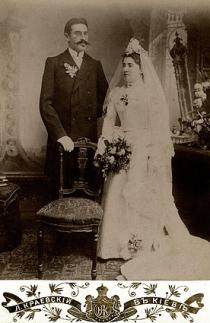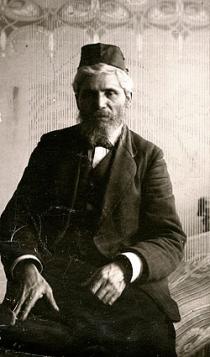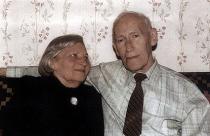Our big family of Khatset-Liebermans. Sitting, from left to right: I, Frida Khatset; my brother Leo Khatset; Lena Khatset, wife of Leo's son Sergey; their son Yura Khatset; wife of my brother Boris Khatset - Lisa Khatset; our housemaid Zina; standing (lower row): wife of my brother Leo Khatset - Nina Khatset; wife of my son Georgiy Sveta Lieberman; my granddaughter Elena Lieberman; my husband Alfred Lieberman; our son Georgiy Liebermna; my brother Boris Khatset; standing (upper row): children of my brother Leo Khatset: Sergei Khatset and Zoya Khatset; Zoya's husband Alik (I don't remember his last name); Zoya's son Alyosha; Alyosha's wife Natasha. Kiev, 1983.
In 1941 I finished 4 years of studies at the University and went to take a training course at the chemical factory in Slavuta in 300 kms from Kiev. On 22 June 1941 my fellow students and I were walking in the town on a lovely day - it was Sunday - when we heard Molotov's speech on the radio. He declared that Hitler attacked the Soviet Union. My father worked as legal advisor at a military plant, and our family evacuated with the plant: my parents, Lev, Boris and I. Our trip lasted for about 3 weeks until we finally arrived at Buzulk station near Kuibyshev, in 2500 kms from Kiev.
In August 1941 my father, brothers and I began to work at the military plant. This plant manufactured aircraft equipment. My father was a legal advisor and my brothers and I worked in shops 10 hours a day.
I met my future husband Alfred Lieberman at the construction unit at the plant. He told me that he was from Kiev and lived in a neighboring street. Alfred was born in Kiev in 1914. His father was a legal advisor in the Ukrainian Red Cross in Kiev. My father knew him. Alfred's mother was a housewife. Alfred was a construction engineer. When Alfred and I met at the plant my father invited him to our home. I liked Alfred. He was an intelligent man. We began to see each other walking in the town or visiting friends and went home in Kiev together in 1944.
9 May 1945, Victory Day, was the happiest day. This was the holiday that didn’t need any administrative prearrangement. This was the brightest day in my life. Everything was in blossom. Alfred and I went for a walk. We came near the Opera Theater and there was a registry office nearby. Alfred said 'Let's drop in and register our marriage'. I said 'I don't have any documents with me'. He replied 'I do', he had my passport with him. We decided to get married when we were in Buzuluk, but since we all lived in a small room there we couldn't even consider having another tenant. After we registered our marriage at the registry office we went to a 'Mineral water' small store across the street from the Opera Theater. There was a private bakery there. We scratched some money in our pockets to buy a bottle of Champaign and cakes. We went home and celebrated our wedding. Our parents were very happy for us. After the wedding Alfred and I lived in my parents' apartment in Kostyolnaya Street, we didn't have a choice. Parents liked Alfred. In 1946 our son Georgi was born.
We began to listen to foreign radio shortly after we returned to Kiev. Lev installed an antenna on the balcony and we managed to listen to quite a few foreign stations. Actually, we could hear them at night the Soviets jammed foreign broadcasts. We listened to 'Svoboda' [Editor's note: American radio station broadcasting in Russian from Germany] radio broadcasts in Russian. We heard about the events in the world and in our country that were not covered by our mass media. We all lived a dual life; we talked about achievements of our country at work and discussed the Soviet reality at home.
Our family was very happy about creation of the state of Israel in 1948. There was coverage of her visit in newspapers. We didn't feel like it was our country, Soviet Union was our Motherland and we were far from Jewish identity, but we did feel proud about our nation getting their own country.
In 1953 our son Georgi went to a Russian school in the center of Kiev. My son was doing well in all subjects, though he preferred exact sciences like Albert. He wasn't raised Jewish, but always identified himself as Jew. He never faced anti-Semitism. He had friends of various nationalities and people treated him well. Our son followed into his father's steps. He graduated from the Faculty of Industrial Construction at the Construction Engineering Institute in Kiev. He is construction design engineer. Georgi has a Russian wife whose name is Svetlana. I had no objections to his marrying a Russian girl. In 1970 their daughter Elena was born. Georgi works a lot and has no free time. They do not observe any traditions: we didn't and Svetlana also grew up in a non-religious family.
In 1960s Alfred and I got very fond of periodical publications. We subscribed to a number of magazines: 'Novi Mir' [popular monthly magazine], 'Inostrannaya Literature' ['Foreign Literature'] from the time they began to be issued after the war. They published books by Soviet and foreign writers. There were shelves full of these magazines in the hallway of our apartment. But most important for us were Samizdat books - the ones that were retyped. We read Solzhenitsyn when it was retyped on thin cigarette tissue. We read books by forbidden authors when it was handed to one another. Our friends gave us copies and we gave them to our friends.
In 1960 I defended my thesis and became a Candidate of Sciences. I liked my work. We had a great team at work. We met at leisure time to go to a theater, Theater of Russian drama that staged plays by Russian and Soviet classical writers and we also shared opinions about what we had read or seen. At weekends Alfred, Georgi and I went to a theater or concert classical.
We liked traveling on vacations and went to a beach on the Dnieper River. Our laboratory was located in Darnitsa on the left bank of the Dnieper and I managed to go for a swim in the river before taking metro to commute to work.
When perestroika began in 1985 books that we had read a long time before began to be published. Therefore, we were not surprised about what they published. We continued subscribing to newspapers and magazines. We listened to 'Svoboda' and radio of Israel - they were not jammed any longer.
My older brother Leo was director of the Radio Trust of Ukraine before retirement. Lev died few year ago. His wife Nina, his daughter Zoya and son Sergei and their families live in Kiev. My younger brother Boris, his wife Lisa and their daughter Irina moved to America in1993. They live in Boston. I know that they are content with their life. They greet me on my birthday or New year.
